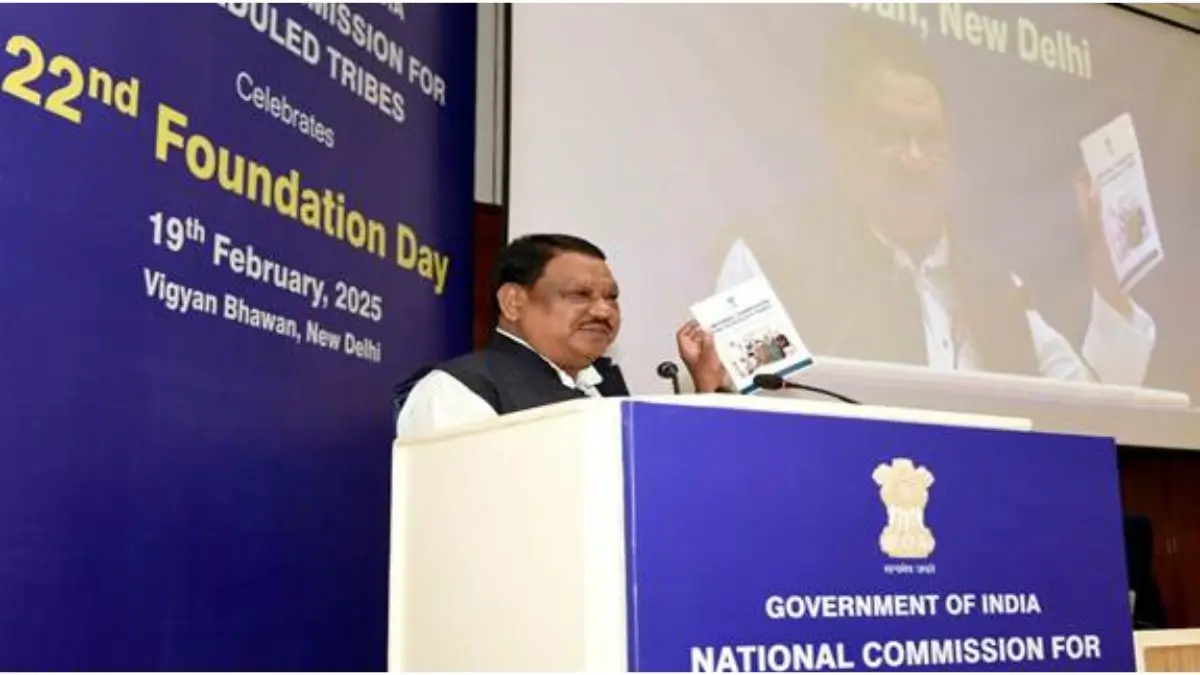The 22nd Foundation Day of the National Commission for Scheduled Tribes (NCST) was celebrated with a series of events highlighting the importance of the Commission’s role in protecting the rights and ensuring the development of Scheduled Tribes (STs) in India. Union Minister for Tribal Affairs, Shri Jual Oram, lauded the proactive initiatives of the NCST, particularly its role in implementing and monitoring the Forest Rights Act. The event featured speeches, discussions, and presentations on the progress of tribal welfare and development. Key government programs aimed at improving the lives of Scheduled Tribes were also highlighted during the occasion.
Key Points from the 22nd Foundation Day Celebrations
Union Minister’s Address
- Shri Jual Oram highlighted the NCST’s role in safeguarding tribal rights and its vital contribution in monitoring the implementation of the Forest Rights Act.
- He assured continued collaboration between the Ministry of Tribal Affairs and NCST to improve the socio-economic status of ST communities.
- Key government initiatives for Scheduled Tribes, such as Eklavya Model Residential Schools, scholarships, and the National Overseas Scholarship, were emphasized.
Chairperson’s Address
- Shri Antar Singh Arya, Chairperson of NCST, discussed the Commission’s activities, including visits to Scheduled Tribe communities across India.
- He mentioned the successful implementation of a 100-day action plan to review the progress of various states, districts, and public sector undertakings in relation to tribal welfare.
Achievements and Progress
- The NCST has consistently worked to safeguard tribal rights and ensure development through continuous monitoring of laws, policies, and programs.
- Particularly Vulnerable Tribal Groups (PVTGs): The identification of 75 PVTGs across India is part of a specialized development plan to address their unique needs.
Inaugural Session and Presentations
- The Secretary of the Commission, Shri Puneet Kumar Goel, provided an overview of the NCST’s work, presenting successful cases and key activities.
- The program included discussions on tribal community progress, skill development, and entrepreneurship, with contributions from National Skill Development Corporation experts and academics from Delhi University.
Guest Speakers and Dignitaries
- Shri Hansraj Gangaram Ahir, Chairperson of the National Commission for Backward Classes, and Shri Vaddepally Ramchander, Member of the National Commission for Scheduled Castes, were among the dignitaries present.
- Other prominent officials and representatives of tribal communities and national commissions attended the event.
Constitutional and Legal Safeguards
- The NCST monitors the legal safeguards provided under the Indian Constitution, specifically focusing on the welfare and protection of Scheduled Tribes in areas such as land rights, forest protection, and livelihood.
About National Commission for Scheduled Tribes (NCST)
- Constitutional Body: The NCST is a constitutional body established to safeguard the rights of Scheduled Tribes (STs) and protect their social, economic, educational, and cultural interests.
- Headquarters: The headquarters of NCST is in New Delhi.
- Scheduled Tribes (STs): According to Article 366(25) of the Indian Constitution, STs are communities that are notified under Article 342 as Scheduled Tribes.
They are primarily located in forest and hilly areas and exhibit characteristics such as,
- Primitive traits
- Geographical isolation
- Distinct culture
- Shyness of contact with larger communities
- Social, educational, and economic backwardness
Constitutional Provisions
- Article 338-A of the Constitution provides for the establishment and functioning of the NCST.
- The Commission’s role is to investigate, protect, and promote the interests of Scheduled Tribes.
Evolution of NCST
- Initially, a Special Officer for SCs and STs was appointed under Article 338.
- The 65th Constitutional Amendment Act (1990) created a high-level multi-member National Commission for SCs and STs.
89th Constitutional Amendment Act (2003) bifurcated the joint Commission into two separate bodies,
- National Commission for Scheduled Castes (NCSC)
- National Commission for Scheduled Tribes (NCST)
Composition
- The NCST consists of a Chairperson, Vice-Chairperson, and three other members, appointed by the President.
- Members serve a three-year term, with no eligibility for more than two terms.
Functions
- Investigate matters relating to constitutional safeguards for Scheduled Tribes.
- Monitor complaints regarding deprivation of rights and protections.
- Advise on socio-economic development plans for Scheduled Tribes.
- Present annual reports to the President, making recommendations on the welfare and development of Scheduled Tribes.
Powers
- The NCST has the powers of a Civil Court, including summoning witnesses, requisitioning documents, and examining complaints.
| Summary/Static | Details |
| Why in the news? | Celebrating 22 Years of Empowerment: National Commission for Scheduled Tribes |
| Union Minister’s Address | Shri Jual Oram emphasized the NCST’s role in implementing the Forest Rights Act and other initiatives for tribal welfare |
| Chairperson’s Address | Shri Antar Singh Arya outlined NCST’s achievements, including the 100-day action plan to monitor tribal welfare progress |
| Key Government Initiatives for Tribes | Eklavya Model Residential Schools, scholarships (pre/post-matric), National Overseas Scholarship |
| PVTG Identification | 75 Particularly Vulnerable Tribal Groups (PVTGs) identified for specialized development plans |
| Key Speakers & Dignitaries | Shri Hansraj Gangaram Ahir (NCBC), Shri Vaddepally Ramchander (NCSC), and other tribal community leaders |
| Development Focus Areas | Skill development, entrepreneurship, and community progress through collaboration with experts and academics |
| NCST’s Role in Safeguarding Rights | Investigating constitutional safeguards, addressing rights violations, and advising on socio-economic development plans |
| Aspect | National Commission for Scheduled Tribes (NCST)/Details |
| Nature | Constitutional body for safeguarding the rights and welfare of Scheduled Tribes (STs) |
| Headquarters | New Delhi |
| Constitutional Basis | Article 338-A of the Indian Constitution |
| Scheduled Tribes (STs) | Communities notified under Article 342 of the Constitution, primarily located in forest and hilly regions |
| Evolution | – 65th Amendment Act (1990): Established NCST and NCSC. – 89th Amendment Act (2003): NCST was bifurcated from SC/ST Commission. |
| Composition | Chairperson, Vice-Chairperson, and 3 members appointed by the President |
| Tenure | 3 years for Chairperson and members (max 2 terms) |
| Main Functions | – Investigate constitutional safeguards for STs – Monitor and address rights violations – Advise on socio-economic development of STs – Submit reports to the President, Parliament, and State Governments |



 Ashmolean Museum Returns 16th Century Sa...
Ashmolean Museum Returns 16th Century Sa...
 Debrigarh Sanctuary To Showcases Rich Wi...
Debrigarh Sanctuary To Showcases Rich Wi...
 BEE Turns 25! Power Minister Unveils BEE...
BEE Turns 25! Power Minister Unveils BEE...








